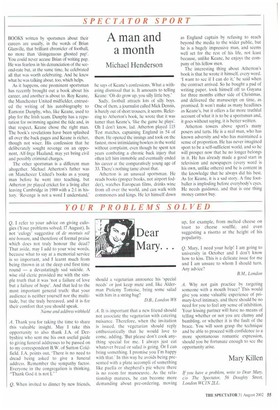A man and a month
Michael Henderson
BOOKS written by sportsmen about their careers are usually, in the words of Brian Glanville, that brilliant chronicler of football, no more than `disingenuous ghosted pap'. You could never accuse Brian of writing pap. He was fearless in his denunciation of the second-rate but, at the same time. he celebrated all that was worth celebrating. And he knew what he was talking about, too, which helps.
As it happens, one prominent sportsman has recently brought out a book about his career, and another is about to. Roy Keane, the Manchester United midfielder, entrusted the writing of his autobiography to Eamonn Dunphy, who, like Keane, used to play for the Irish team. Dunphy has a reputation for swimming against the tide and, in that respect. Keane chose the right man. The book's revelations have been splashed all over the back pages and Keane is richer, though not wiser. His confession that he deliberately sought revenge on an opponent, Alf-Inge Haaland, may yet bring civil and possibly criminal charges.
The other sportsman is a different man altogether. Michael Atherton's father was on Manchester United's books as a young man before he went into teaching, but Atherton jnr played cricket for a living after leaving Cambridge in 1989 with a 2:1 in history. 'Revenge is not a word I understand,' he says of Keane's confessions. What a withering dismissal that is. It amounts to telling Keane: 'Oh do grow up, you silly little boy.'
Sadly, football attracts lots of silly boys. One of them, a journalist called Mick Dennis, is barely out of short trousers, it seems. Referring to Atherton's book, he wrote that it was tamer than Keane's, `like the game he plays'. Oh I don't know, lad. Atherton played 115 Test matches, captaining England in 54 of them. He opened the innings and took on the fastest, most intimidating bowlers in the world without complaint, even though he spent ten years combating a chronic back injury that often left him immobile and eventually ended his career at the comparatively young age of 33. There's nothing tame about that.
Atherton is an unusual sportsman. He reads books (proper books, not airport fodder), watches European films, drinks wine from all over the world, and can walk with commoners and kings. He let himself down
as England captain by refusing to reach beyond the media to the wider public, but he is a hugely impressive man, and seems well set for the rest of his life, not least because, unlike Keane, he enjoys the company of his fellow men.
The interesting thing about Atherton's book is that he wrote it himself, every word. 'I want to see if I can do it,' he said when the contract arrived. So he bought a pad of writing paper, took himself off to Guyana for three months either side of Christmas, and delivered the manuscript on time, as promised. It won't make as many headlines as Keane's, but it offers a far more truthful account of what it is to be a sportsman and, it goes without saying, it is better written.
Atherton towers above sport's many posers and tarts. He is a real man, who has known adversity and who has maintained a sense of proportion. He has never imagined sport to be a self-sufficient world, and so he will prosper now that he no longer belongs in it. He has already made a good start in television and newspapers (every word is his own, unlike others) and he is content in the knowledge that he always did his best. As for Keane, it is a sad story. A fine footballer is imploding before everybody's eyes. He needs guidance, and that is one thing money cannot buy.


























































 Previous page
Previous page